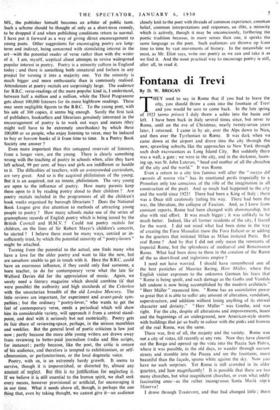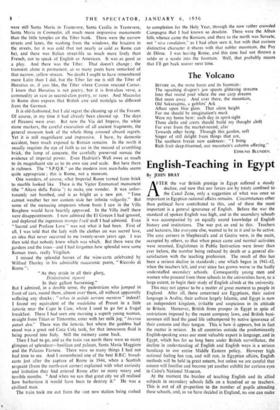Fontana di Trevi
By D. W. BROGAN
THEY used to say in Rome that if you had to leave thi city, you should throw a coin into the fountain of Trevl and you would be sure to come back. In the late spring of 1923 (anno printo) I duly threw a soldo into the basin and left. I have been back in Italy several times since, but never to Rome, until on the eve of Christmas, nearly twenty-seven years later, I returned. I came in by air, over the Alps down to Nice, and then over the Tyrrhenian to Rome. It was dark when we came down at the airport and drove into the city through the new, sprawling suburbs like the approaches to New York through such drab excrescences as Long Island City. But suddenly there was a wall, a gate ; we were in the city, and in the darkness, loom- ing up, was St. John Lateran, " head and mother of all the churches of the city and the world." It was Rome.
Even a return to a city less famous well after the "mezzo del canunin di nostra vita" has its emotional perils (especially to a Proustian only too conscious of the role of the imagination in all construction of the past). And so much had happened to the city and the world since 1923! There had been a King of Italy ; there was a Duce still cautiously feeling his way. There had been the war, the liberation, the collapse of Fascism. And, as I knew from constant reports, Rome had been changed with showmanship, but also with real effort. It was much bigger ; it was unlikely to be much better. Indeed, like all former residents of the city, I feared for the worst. I did not mind what had been done in the way of creating the Foro Mussolini (now the Foro Italico) or in adding to the quarters that imitated Milan as Milan imitated Paris. But real Rome ? And by that I did not only mean the remnants of imperial Rome, but the splendours of mediaeval and Renaissance Rome. What had been done to them in the creation of the Rome of the so short-lived and inglorious empire ?
I need not have worried. I should have remembered one of the best pastiches of Maurice Baring, Herr Muller, where the English visitor expresses to the unknown German his fears that " Rome is being spoilt, and such damage as the Goths and Vandals left undone is now being accomplished by the modern architects." " Herr Muller " reassured him. " Rome has an assimilative power so great that it is able to suffer any amount of alteration, vandalism, superstructure, and addition without losing anything of its eternal character and divinity." " Herr Muller " was Goethe, and was right. For the city, despite all alterations and improvements, buses and the beginnings of an underground, new American-style streets with buildings that jar so badly in colour with the pinks and browns of the real Rome, was the same.
There was, first of all, the majesty and the variety. Rome was not a city of vistas, till recently at any rate. Now they have cleared out the Borgo and opened up the vista into the Piazza San Pietro, where it was possible, in the old days, to wander through narrow streets and stumble into the Piazza and see the fountains, more beautiful than the facade, spume white against the sky. Now you have no such surprises. Yet Rome is still crowded in its older quarters, and how magnificently! It is possible that there are too many churches, but what magnificent churches, or even what oddly fascinating ones—as the rather incongruous Santa Maria sops a Minerva!
I drove through Trastevere, and that had changed little ; there were still Santa Maria in Trastevere, Santa Cecilia in Trastevere, Santa Maria in Cosmedin, all much more impressive monuments than the little temples on the Tiber bank. There were the narrow streets and lanes, the washing from the windows, the braziers in the streets, for it was cold (but not nearly as cold as Rome can be), and there was Italian street-life so much more lively than French, not to speak of English or American. It was as good as a play. And there was the Tiber. That doesn't change ; the transient alone is permanent, as so many poets have remarked of that narrow, yellow stream. No doubt I ought to have remembered more Latin than I did, but the Tiber for me is still the Tiber of Horatius or, if you like, the Tiber where Cassius rescued Caesar. I know that Horatius is not poetry, but it is first-class verse, a commodity as rare as second-class poetry, or rarer. And Macaulay in Rome does express that British awe and nostalgia so different from the German.
It is old-fashioned, but I did regret the cleaning up of the Forum. Of course, in my time it had already been cleaned up. The days of Piranesi were over. But now the Via del Impero, the white stone markers, the careful excavation of all ancient fragments, the general museum look of the whole thing aroused absurd regrets. Yet it is still magnificent and impressive. I have, by domestic accident, been much exposed to Roman remains. In the north it usually requires the eye of faith to see in the mound of crumbling brick, the lump of concrete, the carefully preserved mosaic the evidence of imperial power. Even Hadrian's Wall owes as much to its magnificent site as to its own size and scale. But here there is richness. The " S.P.Q.R." on the modern iron man-holes seems quite, appropriate ; this is Rome, not a museum.
One wonders, of course, what Imperial Rome turned from brick to marble looked like. There is the Victor Emmanuel monument (the " Altare della Patria ") to make, one wonder. It was unfor- tunately not bombed, and is as bright as a new pin. " Time cannot weather her nor custom stale her infinite vulgarity." But some of the menacing emperors whose busts I saw in the Villa Borghese would have heartily approved. In the Villa itself there were disappointments. I now admired the El Grecos I had ignored, and deplored the ingenious trompe l'oeil stuff I had admired. Even " Sacred and Profane Love " was not what it had been. First of all, I was told that the lady with the clothes on was sacred love, an idea that never occurred to me twenty-seven years ago. I was then told that nobody knew which was which. But there were the gardens and the trees—and I had forgotten how splendid were some Roman trees, really Virgilian.
I missed the splendid horses of the wine-carts celebrated by Wilfred Thorley in his admirable macaronic poem, " Ricordo di Roma ": " As they stride in all their glory,
Distintissimi signori
In their gallant harnessing."
But I admired, in a double sense, the pedestrians who jumped in front of cars, round them, almost over-them, all without apparently suffering any shocks ; " rebus in arduis servare mentem" indeed! I found my equivalent of the madeleine of Proust in a little latteria near the Capo le Case, where I used to go for a frugal breakfast. There I had seen one morning a superb young woman, straight from Titian or Tintoretto, enter with her milk jug, " incessu patuit dea." There was the latteria. but where the goddess had stood was a great red Coca Cola tank, for that innocuous fluid is being poured into Italy. Still the memory came back.
Then I had to go, and as the train ran north there were so many glimpses of splendour—basilicas and palaces, Santa Maria Maggiore and the Palazzo Farnese. There were so many things I had not had time to see. And I remembered one of the best B.B.C. broad- casts just after the capture of Rome in 1944, when a Scottish sergeant (from the north-east corner) explained with what curiosity and irritation they had entered Rome after so many weary and terrible months. " And when we saw that great city we all realised bow barbarious it would have been to destroy it." He was a civilised man.
The train took me out from the vast new station being rushed
to completion for the Holy Year, through the now rather crowded Campagna that I had known so desolate. There were the Alban hills whence came the Romans, and there to the north was Soracte, not " nive candidum," as I had often seen it, but with that curious distinctive character it shares with that nobler mountain, the Puy de Dome. I was leaving Rome, and this time had not thrown .a soldo or a scudo into the fountain. Well, that probably means that I'll get back sooner next time.







































 Previous page
Previous page